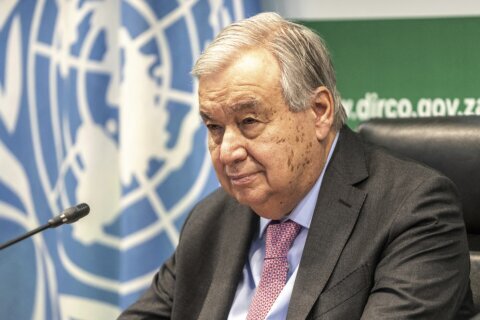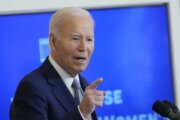UNITED NATIONS (AP) — Sometimes the issues brought forward at the United Nations signature annual meeting may feel a bit familiar. Climate change is always in focus, especially in the past few years. There are regular disputes about who is on the security council. Pleas to stop wars and address hunger.
But this year, it’s what’s not getting as much attention that has Ukraine concerned.
The war in Ukraine was center stage the last two times that world leaders convened for the high-level meeting of the General Assembly. But this year, the Israel-Hamas war in Gaza and the escalating developments along the Israeli-Lebanese border have gotten much of the spotlight.
Ukraine president VOLODYMYR ZELENSKYY, at the podium, implored world leaders not to give in to calls for a ceasefire that doesn’t guarantee Ukraine’s sovereignty. “When some propose alternatives, half-hearted settlement plans, so-called sets of principles, it not only ignores the interests and suffering of Ukrainians who are affected by the war the most, it not only ignores reality, but also gives Putin the political space to continue the war,” Zelenskyy said.
Here’s your daily guide to what’s going on at the United Nations this week, day by day:
From the podium
French President EMMANUEL MACRON told the U.N. General Assembly that “Israel cannot, without consequence, just expand its operations to Lebanon.” He urged Israel to cease the escalation, and Hezbollah to cease missile launches to Israel.
Panama President JOSE RAUL MULINO drew attention to the humanitarian crisis playing out in his country. More than half a million migrants crossed the Darien jungle last year that joins Colombia and Panama. “Panama today is the new border of the United States,” Mulino said, noting that the migrants crossing his country are seeking a better life in the U.S. “I ask you to see the magnitude of what is happening because we feel like we don’t have the international support we are due.”
On the sidelines
The chance of a ceasefire proposal to try to stop fighting between Israel and Lebanon took up a lot of oxygen behind the scenes on Wednesday. Rumors floated through the halls, and France called a last-minute session to discuss the conflict. At the session, French Foreign Minister JEAN-NOEL BARROT said later in a meeting of the Security Council that France was working with the U.S. on a proposal for a 21-day ceasefire.
Climate moment
In a special high-level summit to address the impacts of rising seas, small island nations pleaded for the survival and insisted on their sovereignty despite overflowing oceans. Sea level rise “threatens the well-being of our peoples’ cultures, food security and livelihoods,” said Samoan Prime Minister FIAME NAOMI MATA’AFA, speaking for 39 small island nations. Marshall Islands President HILDA HEINE and others said even if their lands are submerged, their nations should still be recognized, asking the world not to “rig the map and try to erase us with a pencil… sovereignty ultimately rests with our people, not in distant diplomatic centers.” U.S. Secretary of State ANTONY BLINKEN said the United States is committed to counter — or at least adapt to — rising sea levels that pose an existential threat to many coastal communities around the world. Blinken also said that the Biden administration would oppose any effort to limit or curtail the rights of any countries affected by it.
Voices you might have missed
“Globalization has failed in its mission to bring prosperity to people.”
—XIOMARA CASTRO, president of Honduras
___
“In this emerging global order, we must ensure the United Nations remains at the forefront of global governance. If multilateralism is to trump unilateralism, the UN’s role, as the world’s foremost multilateral organization, is pivotal. With the necessary resources and resolve, the UN can ensure a future of peace, sustainable development, and human dignity.”
—MOHAMED IRFAAN ALI, president of Guyana
___
Island nation leaders warned about sea level rise in the most dire and personal terms. “Our future is uncertain,” Fiji President WILIAME KATONVIERE said. “Will our children and their children have a place to call home?” And Maldives President MOHAMED MUIZZU said: “An emergency is upon us, threatening our way of life. Our fight to live on will survive.”
Something you might not know
Leaders’ speeches take a variety of forms and are delivered in a variety of languages — some rendered on plain paper, others on elaborate letterhead. Taken collectively, they represent the words and ideas of an entire governed world — and the politics and maneuverings that come with leading, or helping to lead, one of the nations of Earth. In photos, you can sometimes see the speech on the lectern, including one of Zelenskyy from Wednesday.
One notable number
Number of speakers scheduled at a last-minute, evening Security Council session on conflict between Israel and Lebanon: 24
Quotable
“Colleagues, I’m often asked which one issue keeps me up at night. What I always say is this: We can’t afford to limit our attention to just one issue.”
— U.S. Ambassador to the United Nations LINDA THOMAS-GREENFIELD, speaking to the Security Council
___
“Annihilation may bring military success but not political or moral victory. If security systems take over every political decision you forfeit your option to negotiate.”
—MIRJANA SPOLJARIC EGGER, president of the International Committee of the Red Cross
___
“Rising seas mean a rising tide of misery. Communities swamped, fresh water contaminated, crops ruined, infrastructure damaged, biodiversity destroyed, and economies decimated – with sectors such as fisheries, agriculture, and tourism pummeled. The poorest and most vulnerable are hardest hit.”
—U.N. Secretary-General ANTONIO GUTERRES
___
“Do not divide the world. Be united nations. And that will bring us peace.”
—Ukraine’s Zelenskyy, to leaders at the General Assembly
Up next
Palestinian President MAHMOUD ABBAS is scheduled to speak Thursday morning and Israel’s Prime Minister BENJAMIN NETANYAHU on Friday.
___
AP writers Seth Borenstein, Michael Weissenstein and Matthew Lee contributed. See more of AP’s coverage of the U.N. General Assembly at https://apnews.com/hub/united-nations
Copyright © 2024 The Associated Press. All rights reserved. This material may not be published, broadcast, written or redistributed.






